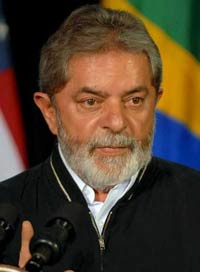Brazilian Lula da Silva leads star-studded delegation in last push to host 2014 World Cup
Brazilian President Luiz Inacio Lula da Silva was flying to Zurich with a star-studded entourage on Monday to push his country's bid to host the 2014 World Cup.

Even though Brazil is the only candidate, FIFA president Sepp Blatter had recently questioned the country's infrastructure and bid plans, even warning that he could reopen the whole bidding process.
But the world soccer body announced Thursday that a stadium-inspection trip in August showed that Brazil could put on "an exceptional" tournament.
All of which makes Brazil's 30-minute presentation Tuesday before FIFA's executive committee little more than a formality.
Brazilian Sports Minister Orlando Silva, Brazilian Football Confederation (CBF) president Ricardo Teixeira, national coach Dunga and veteran striker-turned-coach Romario will be among those presenting the bid.
After the presentations, FIFA will announce whether Brazil will host the tournament - and it would be a major shock if the answer was no.
Also Tuesday, Germany and Canada will be competing head-to-head for the right to host the 2011 Women's World Cup.
There are plenty of reasons why Brazil should get the 2014 showcase.
All of South America is united behind the bid and FIFA limited 2014 applications to that continent. Brazil has not hosted a World Cup since 1950, its current players are key members of soccer's most important clubs and there is no question that Brazilians love "el jogo bonito" - the beautiful game.
"It's the most important sport for us - there is nothing else," said Uallace Huguenin Fartura, a 26-year-old Brazilian student in Zurich.
Brazil has 10 of the world's 100 largest soccer stadiums - more than any other nation, even China.
Maracana, Rio's revered soccer stadium, remains the site of the world's most-attended soccer match ever, the 1950 World Cup final where over 200,000 fans saw the home team lose 2-1 to Uruguay. Renovations have since reduced its capacity to 95,000 seats, with thousands more standing.
Yet Blatter had reason to question Brazil's infrastructure.
Maracana hosted the Pan American Games this summer, but security issues left hundreds stranded in long lines outside and the opening ceremony began late - something FIFA won't tolerate when world television rights have been sold.
A July 17 plane crash in Sao Paulo killed 199 people and exposed Brazil's festering aviation safety crisis. On the ground, frequent traffic jams and an overwhelmed public transportation system are major complaints.
There's also the issue of violence. Brazil is one of the most dangerous countries in the world, with over 55,000 people murdered in 2006, according to Brazil's Justice Ministry. That's about 150 people a day.
Drug gangs in Rio de Janeiro brazenly torched buses and fired upon police stations in daylight raids earlier this year. Vast areas in the city's shantytowns are no-go zones for Brazilian police, who also have a decades-long history of corruption. Maracana itself is surrounded by poor, dangerous neighborhoods.
In the race for the 2011 Women's World Cup, both candidates have strong credentials: Canada set attendance records this summer as it hosted the Under-20 World Cup, while Germany produced FIFA's most financially successful World Cup ever in 2006.
Canada will highlight its multiculturalism, a time zone span that makes prime-time games possible in Europe as well as the Americas, and its financial support for women's soccer. According to communications director Richard Scott, the Canadian women's national team was better funded this year than the men's, a claim few other countries can make.
The German women won this year's World Cup without allowing a single goal - but their nation is the favorite to be chosen Tuesday due to an accident of history. Because of the 2003 SARS epidemic, the United States has hosted two out of the last three women's World Cups - making FIFA likely to send the 2011 tournament back to Europe.
Subscribe to Pravda.Ru Telegram channel, Facebook, RSS!




